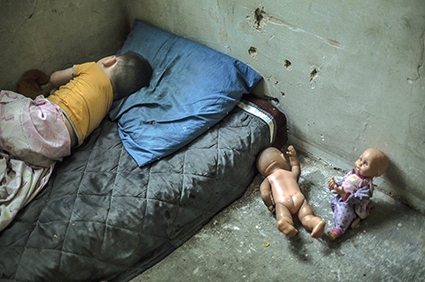Clothes Donation for IDPs & Socially Vulnerable- Join Us!
Georgian government forces fought three wars against Russian-backed separatist forces in Abkhazia and South Ossetia from 1991 to 2008. According to the latest statistics of the Georgian Ministry of IDPs from the Occupied Territories, Accommodation and Refugees, there are currently 263,598 registered IDPs in Georgia as a result.
At the end of summer, BBC photographer Jacob Borden and journalist Tbel Abuseridze compiled a photo reportage that was passed around social media detailing the plight of two groups of IDPS and socially vulnerable families living in conditions of extreme poverty in the Georgian capital, Tbilisi.
On seeing the reportage, I decided to visit the mentioned buildings. One was an old hospital near the Bazroba market, whose residents were made up mainly of IDPS. IDPs have seen greater recognition and support from the government in recent years and so their accommodation had been “touched up” with new PVC windows. Many had started their own home improvements on their illegal living quarters, evidence that a number of them had found employment. Some 10 families in the same settlement, however, classed as “socially vulnerable,” had received no such support and are struggling to find work. One woman, Ia Ochiauri, 42, has two young children plus two children over 18. State family support keeps them fed, but clothing, toys, educational materials and comfortable living standards are seriously lacking.
At the ex-military hospital tucked behind the new Carrefour in Isani district- a behemoth of concrete, rubble and overwhelming abandonment -the situation was even worse. Glass-less or boarded up windows, the electricity supply home-made (and often cut off by the authorities), and the same for the water pipes (scavenged supplies bring water to one point in each corridor for communal use)…Gas for cooking comes in the form of small camping tanks, while heating is through small wood-burners powered by the logs the government dumps in the front yard once each winter.
There are 170 children living on the territory. I tried to engage the mothers of these children to give us their names and sizes so that a very kind donor I know could buy each child a winter coat. They refused, claiming that two organizations had taken their information before us, promising help which then never came.
They are, as the BBC report so adequately put it, the “Forgotten Ones.” Many in the Isani area did not know of their existence, though they first occupied the building some seven years ago. Some family members work, but “on the black,” not daring to live in better conditions for fear of losing state benefits. Many, though, are genuinely poor- stuck in a rut, lacking education and social support, lacking the love and respect of society. Even my own society in the UK shuns “scroungers” and “squatters,” but I still recognise that they are people. It is the government’s responsibility to make sure they are living in safety and comfort, that they are educated and trained to be more productive and a boost to the economy rather than a drain on it. It is our job, as fellow citizens, to show we care.
As such, on Saturday November 5, from 3 - 5pm at Fabrika, I am inviting readers and their colleagues to donate their old clothes and shoes (men's, women's, children’s), books and toys which I will then take to the two settlements the same day. A little bit of happiness and recognition goes a long way. Come along to the donation event and enjoy a special offer from Tone restaurant- 5 GEL all-you-can-eat buffet and a glass of wine to all donators!
WHERE: 8 Egnate Ninoshvili Str.
WHEN 3 – 5 pm
Katie Ruth Davies
Photo: Jacob Borden BBC












